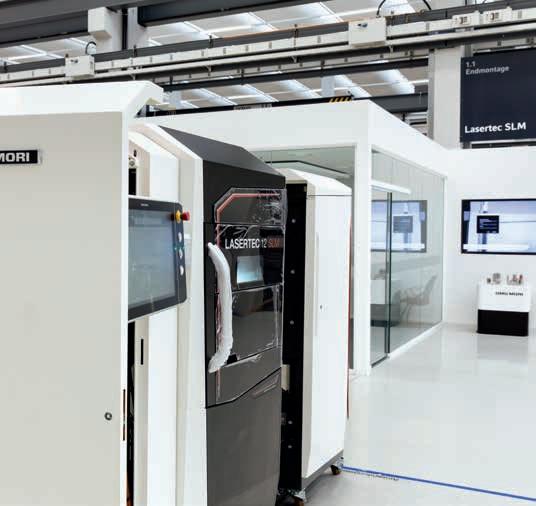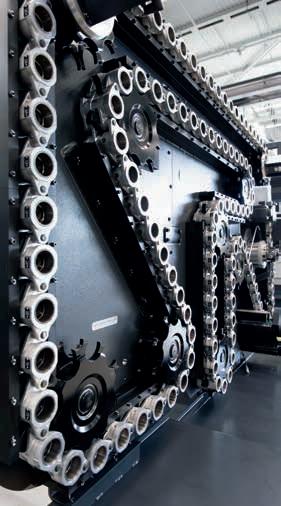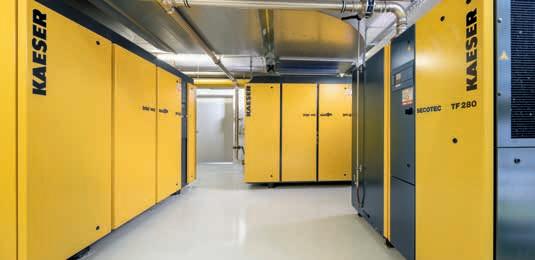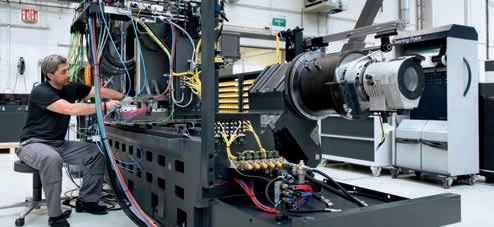
5 minute read
Simulation and reality
Global value chains begin with high-precision machine tools and sustainable technologies from DMG MORI. Integrated automation and end-to-end digitisation solutions expand the core business with turning and milling machines, advanced technologies and additive manufacturing.

DMG MORI products are delivered worldwide
DMG MORI AKTIENGESELLSCHAFT is a worldwide leading manufacturer of machine tools with sales revenues of over € 2.0 billion and more than 6,800 employees. In the “Global One Company”, around 12,000 employees are in direct contact with over 100,000 customers from 55 industries. DMG MORI is present in 87 countries worldwide – with 15 production plants, 111 sales and service locations – and is actively advancing the future fields of automation, digitisation and sustainability.
DMG MORI consolidates technology excellence in the leading industries of aerospace, automotive, die & mould, medical, and semiconductor. With the DMG MORI Qualified Products (DMQP) partner programme, perfectly matched peripheral products are offered from a single source. Customer-oriented services accompany the entire life cycle of a machine tool – including training, repair, maintenance, and spare parts service. All service processes are digitised with the “my DMG MORI” online customer portal, which enables digital, direct access to service experts. DMG MORI takes a global and holistic approach to sustainability. Both the “Company Carbon Footprint” and the “Product Carbon Footprint” are carbon neutral – and this applies throughout the entire supply chain to the customer.
Counteracting rising energy prices
The company is addressing the issue of rising energy prices by utilising the very latest compressed air technology. The success of a technology leader such as DMG MORI is as dependent on the competitiveness of its products as it is on the efficiency of its production processes and equipment; compressed air technology is no exception. Compressed air is required throughout production as sealing air (so-called sealing air is used to seal a cavity with the help of air or gas overpressure) to prevent dirt or moisture ingress into the measurement systems and spindles. Furthermore, compressed air is needed to power pneumatic cylinders for the opening and closing of doors and for “air showers” to blow off workpieces during tool changes. The grippers on the robot equipment would also not function without compressed air. Compressed air is therefore essential in every stage of production at DMG MORI. Even before the energy crisis, it was clear that large-scale modernisation of the compressed air station was necessary.
Gerd Kleinegrauthoff, Maintenance Workshop Manager at the Bielefeld site, summarises the initial situation: “The old systems were unreliable, we had frequent fault messages and there was significant potential for improvement in terms of energy consumption.” As early as 2020, the search for a suitable supplier began. The company’s top priorities for the new system were reliability, redundancy and, most importantly, energy efficiency. Quotes were subsequently obtained from several providers. Maik Jagiello, Head of Corporate Real Estate Management, explains: “What we were looking for was a comprehensive concept, but most providers only came up with a 1:1 replacement solution for our existing system. KAESER qualified right from the outset through the professionalism of the entire project management process. KAESER has intensively dealt with the question of what the best solution for DMG MORI is. Following an extensive compressed air demand analysis, a total of seven different configurations were calculated and the corresponding simulations were presented. One of these turned out to be the perfect solution for us.”

The KAESER compressed air station includes everything that modern technology has to offer in terms of energy efficiency.
The advanced compressed air station, calculated according to the latest compressed air technology findings, comprises two speed-controlled KAESER DSD 145 rotary screw compressors (max. pressure 7.5 bar, max. flow rate 14 m³/min) with energy-saving Super Premium Efficiency drive motors. Two energy-saving SECOTEC TF 280 refrigeration dryers take care of compressed air treatment, whilst the SIGMA AIR MANAGER 4.0 master controller ensures best possible interplay between all components and consequently saves even more energy. But that’s not all – as we know, any reduction in network pressure has a noticeable effect on operating costs: energy demand reduces by at least 6 percent for each 1 bar reduction in working pressure. With this in mind, KAESER performed various tests following commissioning to determine the optimal pressure value that was high enough to sufficiently cover total demand, yet which was able to keep the cost level as low as possible. The goal of optimised cost efficiency for the new station has therefore been fully achieved.

A machine tool manufactured to customer specifications receives its final touches.
When asked if reliability and redundancy, the two other key points on the wish list, have also been met, Maik Jagiello enthusiastically responds: “The system has been running smoothly and reliably since 2021. Together with the full service contract from KAESER, we are safe in the knowledge that we have everything covered.”








